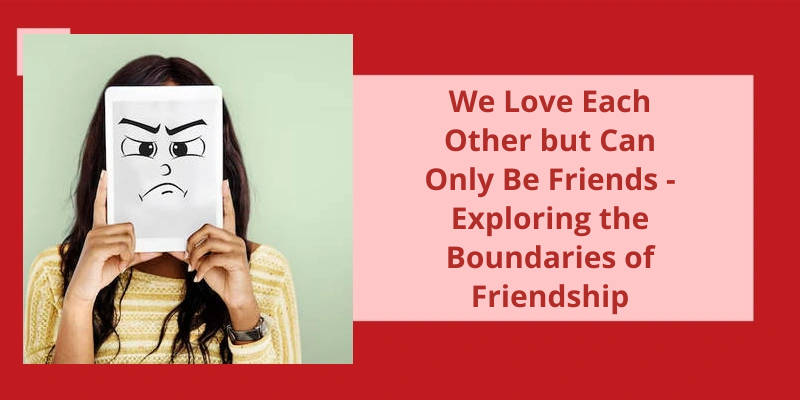How Do You Be Just Friends With Someone You Were in Love With?
When it comes to maintaining a friendship with someone you were once in love with, it can be a delicate dance. The first and most crucial step is to completely let go of any ulterior motives. Accept that the romantic feelings you once had are no longer reciprocated and focus solely on building a strong platonic connection. This can be difficult, especially if the romantic feelings are still lingering, but it’s essential in order to preserve the friendship.
While it’s important to be a supportive friend, it’s equally vital to avoid being a doormat. Set boundaries and don’t compromise your own well-being for the sake of the friendship. It’s okay to say no if something doesn’t feel right or if it will only make your unrequited feelings worse. Prioritize your own emotional health and don’t let the friendship become a source of constant pain.
Respect is a fundamental aspect of any successful friendship, regardless of past romantic involvement. Treat your friend with the same level of respect you’d show any other friend. Avoid crossing boundaries and seek their consent in all aspects of the friendship. Be mindful of their emotions and understanding of their perspective.
To truly maintain a healthy friendship, be a genuine and reliable friend. Show up for them when they need support or guidance, just like you’d for any other friend. Form a strong foundation based on shared interests, trust, and understanding. Invest time and effort into nurturing the friendship, without expecting anything more than a fulfilling and mutually beneficial platonic connection.
While transitioning from romantic love to friendship, it’s crucial to give yourself the space you need to heal and move on. Taking some time apart can allow you to process your emotions, gain perspective, and ultimately come to terms with the fact that a romantic relationship isn’t possible. Use this time to focus on self-care, engage in activities that bring you joy, and explore other friendships and interests.
Lastly, it’s important to treat your friend like any other friend. Avoid singling them out or treating them differently because of your past romantic history. Dont allow jealousy or resentment to cloud the friendship. Instead, approach the friendship with a fresh perspective and embrace the opportunity to build a new connection that’s rooted in genuine care and friendship. Remember, it’s possible to have a fulfilling and rewarding friendship with someone you once loved as long as you approach it with honesty, respect, and a genuine desire for their happiness.
Communicating Openly and Honestly About Your Feelings: Discussing the Past Romantic Relationship and How It Has Affected Both of You Can Help Establish a Strong Foundation for a Friendship Moving Forward.
Communicating openly and honestly about your feelings is crucial when navigating a transition from a romantic relationship to a friendship. By discussing the past romantic relationship and how it’s affected both of you, you can establish a strong foundation for your friendship moving forward. This open dialogue allows you to address any unresolved emotions or concerns, enabling you to better understand each other’s perspectives. It also helps set clear boundaries and expectations for your friendship, ensuring that both parties feel comfortable and respected. By acknowledging and processing your past as a couple, you can pave the way for a healthy and fulfilling platonic connection.
It’s a question that’s puzzled many: can two people who’ve been in love with each other simply remain friends? While it’s important to avoid using a platonic connection as a convenient substitute for a failed romantic relationship, genuine friendship can indeed emerge from a breakup.
Can Two People Who Love Each Other Just Be Friends?
The dynamics of love and friendship can often intertwine in complex ways. Many people question whether it’s possible for two individuals who love each other to remain just friends. As humans, we’re capable of forming deep emotional connections with others, and it’s only natural for these connections to evolve over time. Love, however, can take many forms – not solely romantic.
In the case of a breakup, the transition from a romantic relationship to a friendship can be challenging, but not impossible. Both individuals need time and space to heal and move on from the romantic aspect of their relationship. It’s crucial to avoid attempting to substitute a platonic friendship for the romantic bond simply for the sake of comfort and familiarity. Genuine friendship should be cultivated on it’s own, based on mutual respect, trust, and shared interests.
When two people truly love each other, the foundation of their connection remains, even after the romance fades. This can serve as the groundwork for a beautiful, fulfilling friendship. A deep understanding of one anothers strengths and weaknesses, as well as shared experiences and memories, can create a strong bond of friendship. The key is to approach the transition with honesty, clear communication, and a genuine desire to see each other happy and fulfilled.
It’s important to note that transforming a romantic relationship into a friendship may not happen immediately. Both individuals must go through a period of personal growth and self-reflection to determine what they truly want from the relationship. Time apart can help them gain perspective and re-evaluate their feelings. Only after this introspective journey can they assess whether a genuine friendship is possible and beneficial for both parties.
In some cases, a friendship may not be possible due to the lingering emotions or unresolved conflicts between two individuals. It’s crucial to acknowledge these limitations and accept that maintaining a romantic connection may be detrimental to the well-being of both individuals. As painful as it may be, it’s sometimes necessary to let go completely and give each other the space to grow individually.
The Challenges and Benefits of Maintaining a Friendship After a Romantic Relationship
- Acknowledging and navigating the shift in dynamic
- Dealing with unresolved emotions and potential triggers
- Establishing new boundaries and expectations
- Building a foundation of trust and open communication
- Learning from past mistakes and growing individually
- Gaining a deeper understanding and appreciation for each other
- Enjoying the familiarity and shared history
- Supporting each other through future relationships
- Celebrating the unique bond that evolved from romance to friendship
Navigating the delicate transition from romantic feelings to friendship can be a challenging task. While it’s often difficult for individuals to move beyond the discomfort and tension, some have managed to maintain a platonic bond despite experiencing unrequited love. Although not always feasible, the possibility of preserving a friendship amidst lingering emotions remains a hopeful prospect for certain individuals.
Is It Possible to Be Just Friends With Someone You Love?
Is it possible to be just friends with someone you love? This question is one that many people have pondered at some point in their lives. Staying friends with someone after developing real romantic feelings for them can be a challenging feat. However, it isn’t unheard of for two people to successfully navigate the transition from lovers to friends. Although it’s common for two people to struggle to move past the potential awkwardness that comes with unrequited love, it’s still possible for some individuals.
Maintaining a friendship with someone you love but can’t be romantically involved with requires a certain level of emotional maturity and mutual understanding. Both parties need to be able to acknowledge and accept the reality of their situation without letting it hinder their connection. Additionally, it may be necessary to establish new boundaries and expectations within the friendship to prevent any lingering feelings from causing discomfort.
Communication is key in this delicate scenario. Open and honest conversations about feelings and intentions can help both individuals gain clarity and navigate the complexities of their relationship. It’s crucial for both parties to be on the same page and actively work towards maintaining a healthy friendship without any romantic involvement.
However, it’s important to recognize that not all friendships can withstand the transition from romantic love to platonic affection. In some cases, the unrequited love may be too painful or the emotions too difficult to suppress, making it impossible to remain friends without constant turmoil. In these instances, it may be necessary to take a step back and reassess the dynamics of the relationship, potentially deciding to create some distance for the sake of self-preservation.
How Do You Stay Friends With Someone Who Doesn’t Love You Back?
How do you stay friends with someone who doesn’t love you back? Communication. The key to staying friends with someone after nonreciprocal and/or reciprocal feelings is communication. Keep in mind that if someone truly cares about you as a friend, they’ll be more than willing to talk to you about important things.
It’s important to have an open and honest conversation about your feelings and the boundaries of your friendship. Both parties need to understand and respect each others emotions. This may include discussing what you both feel comfortable with in terms of physical boundaries, such as hugging or holding hands, and establishing clear boundaries to avoid any confusion or mixed signals.
Another aspect of maintaining a friendship in this situation is finding common ground. Focus on the shared interests and activities that brought you together in the first place. Engaging in hobbies or activities that you both enjoy can help strengthen your bond and create new memories that arent centered around romantic or emotional attachment.
Acceptance is also key. Understand that it’s perfectly okay for someone to not have romantic feelings for you. It doesn’t devalue your friendship or make it any less meaningful. Learning to accept and respect their feelings will enable you to move forward and nurture the friendship without any resentment or negative emotions.
Additionally, it’s essential to keep some distance if necessary. Sometimes, space is needed to heal and reassess your own emotions. It’s okay to take time for yourself and prioritize your own emotional well-being. This might involve spending time with other friends, focusing on personal growth, or engaging in self-care activities.
Lastly, remember that friendships evolve and change over time. It’s possible that as you both grow and experience different things, your feelings towards each other may shift. Keeping an open mind and being willing to adapt to these changes can help maintain a healthy and fulfilling friendship, even if it doesn’t follow the typical romantic narrative.
Setting Boundaries in a Friendship With Unrequited Love
Setting boundaries in a friendship with unrequited love is essential to maintain a healthy and respectful relationship. When one person has romantic feelings while the other sees the relationship strictly as a friendship, it can create emotional confusion and discomfort.
Communicate openly with your friend about your feelings and discuss the need to establish boundaries that will protect both individuals’ emotions. This might involve limiting physical contact or finding ways to redirect romantic gestures into platonic expressions of care and support.
Remember that setting boundaries doesn’t mean ending the friendship but rather creating a framework that allows both parties to feel comfortable and secure. With clear communication, empathy, and mutual respect, a friendship can thrive even in the face of unrequited love.
Unrequited love or one-sided love is a term commonly used to describe the situation when two people have feelings for each other but are unable to be together for various reasons. This emotional state can be incredibly painful, as the individuals involved may long for a relationship that can’t be fulfilled.
What Is It Called When Two People Love Each Other but Can’t Be Together?
Unrequited love is a term used to describe a situation where one person has deep feelings of love or affection for another person, but those feelings aren’t reciprocated. In other words, it’s a one-sided love where one person loves the other, but the feeling isn’t mutual.
When two people have a strong liking or love for each other but are unable to be together, it can be a complex and challenging situation. This can happen for various reasons, such as being in committed relationships with other people, distance, cultural differences, or simply incompatible life goals. In such cases, there may be a deep sense of sadness, longing, and frustration because the two individuals are aware of their feelings but are unable to pursue a romantic relationship.
This type of situation can lead to a unique bond of friendship between the two individuals. While the romantic aspect may not be possible, they often develop a deep emotional connection and genuinely care for each other. They may confide in each other, support each other through difficult times, and share a strong mutual understanding.
Navigating the boundaries of friendship in such circumstances can be challenging. The individuals involved must establish clear communication and set healthy emotional boundaries to prevent any misunderstandings or hurt feelings. It requires significant emotional intelligence and maturity to maintain a platonic relationship while acknowledging the underlying feelings of love or attraction.
Ultimately, the decision to remain friends while knowing that a romantic relationship isn’t possible depends on the individuals involved and their ability to cope with their emotions. Some may find it too painful and choose to distance themselves, while others may find solace in the deep, affectionate bond they’ve created as friends. It’s a delicate balance that requires introspection and honesty to determine what’s best for both parties involved.
How to Establish Healthy Emotional Boundaries in a Platonic Relationship
Establishing healthy emotional boundaries in a platonic relationship is crucial to maintaining a strong and balanced friendship. Here are a few tips to help in this process:
1. Communicate openly: Talk with your friend about your feelings and expectations regarding boundaries. Ensure that you both have a clear understanding of where the boundaries lie and respect each other’s emotional needs.
2. Define your personal space: Establish limits on physical affection, personal information sharing, and emotional support. It’s important to create a comfortable space where both friends feel respected and secure.
3. Set time boundaries: Be mindful of how much time you spend together, and make sure to maintain a healthy balance between your friendship and other aspects of your life. It’s essential to prioritize self-care and individual goals.
4. Honor your own emotions: Acknowledge and respect your own boundaries, even if it means taking a step back from the friendship temporarily. Understanding your limits and prioritizing your emotional well-being is fundamental.
Remember, setting boundaries in a platonic relationship doesn’t mean you love or care for your friend any less. It simply helps maintain a healthy and sustainable friendship in the long run.
Conclusion
In conclusion, the boundaries of friendship can often be complex and challenging to navigate, especially when two individuals deeply care for one another but are unable to develop a romantic relationship. In situations where "we love each other but can only be friends," it becomes crucial to communicate openly, set clear expectations, and respect each other's emotions. Developing a strong platonic bond requires honesty, transparency, and understanding. By embracing the boundaries that exist, two people can cultivate a deep and lasting friendship, supporting each other's personal growth and happiness. Ultimately, it’s up to the individuals involved to decide the nature and limits of their connection, as long as it’s built on mutual consent and understanding.






